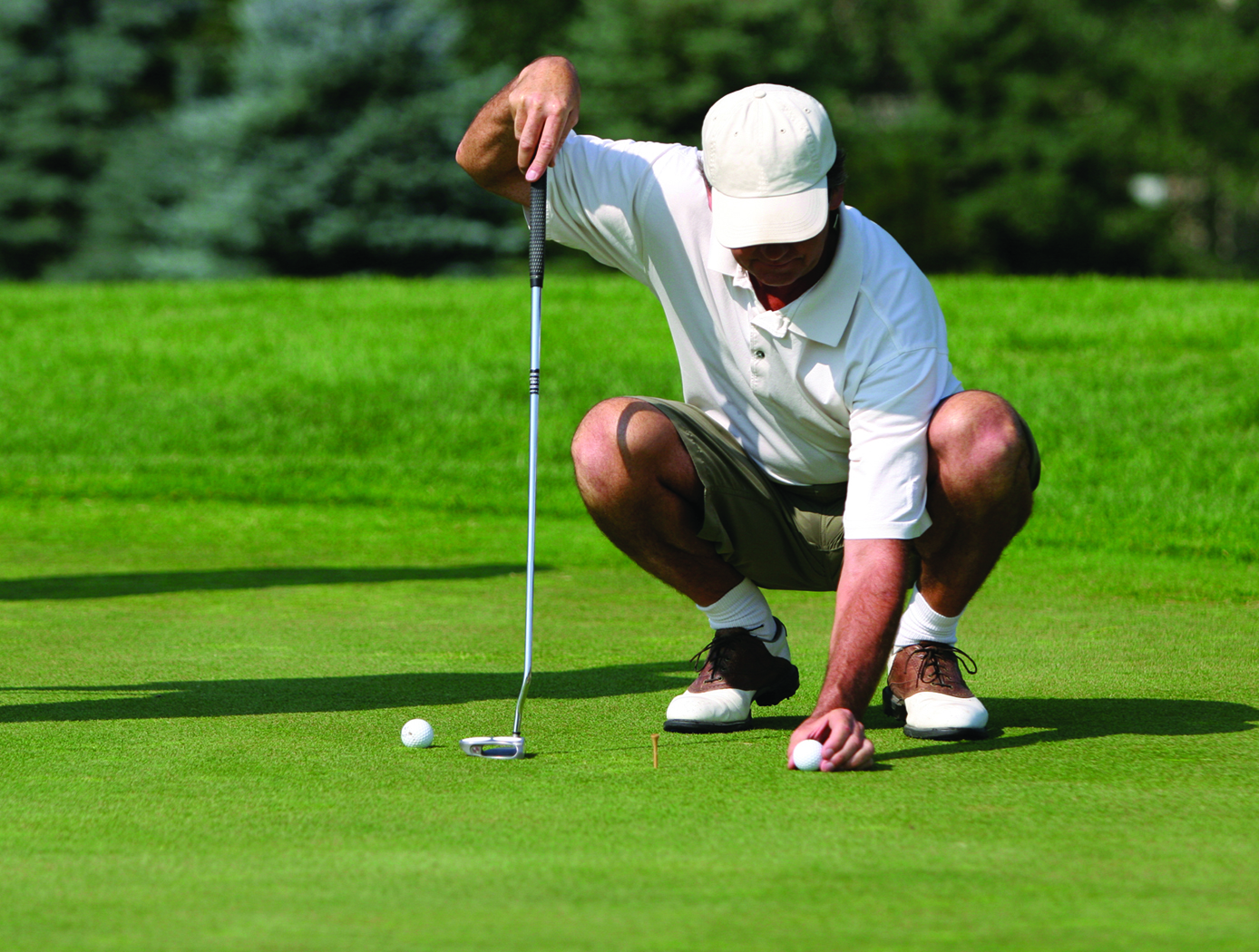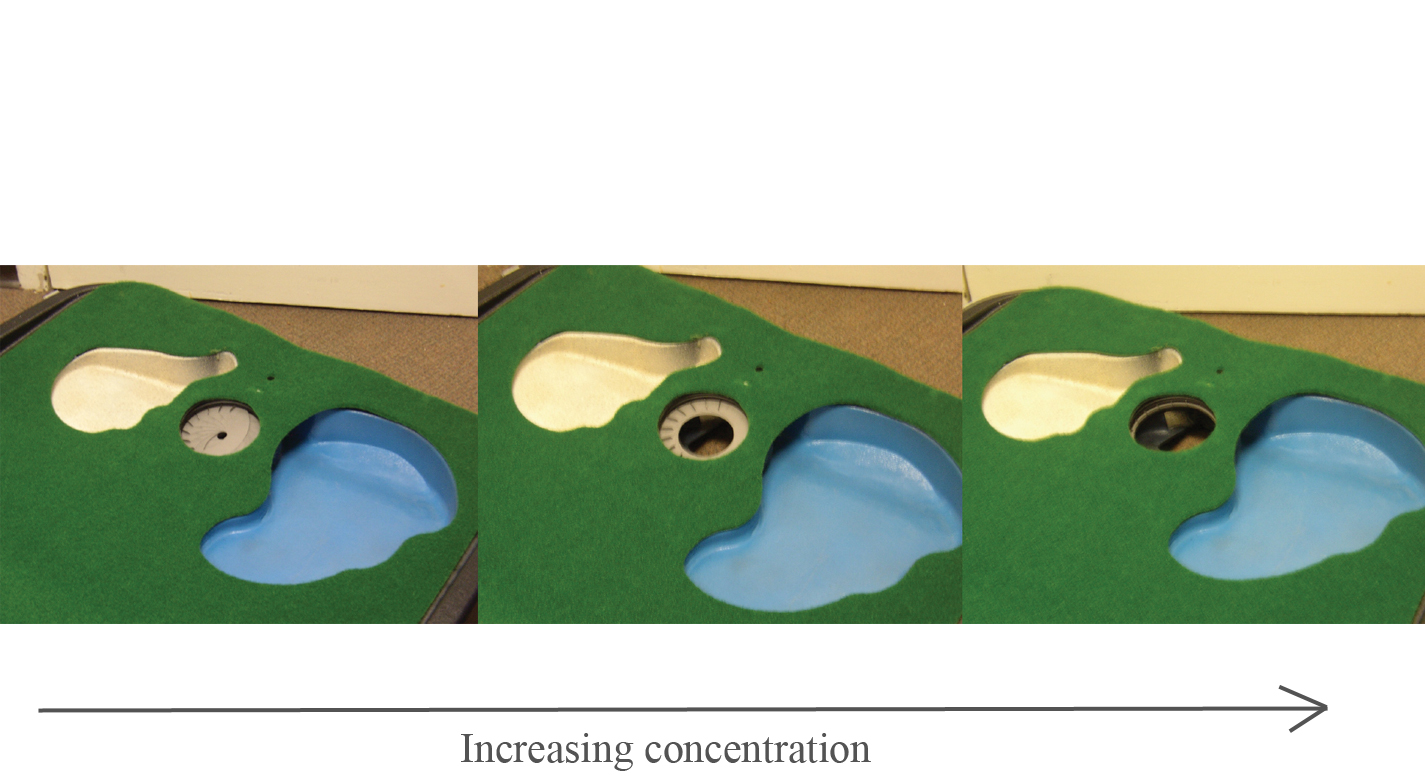ZONE (Zeroing Out Negative Effects)
Instrumentation
ZONE (Zeroing Out Negative Effects) (LAR-TOPS-4)
Biofeedback training for optimal athletic performance
Overview
NASA's Langley Research Center has developed ZONE, an innovative method for improving athletes responses to stress, anxiety, and loss of concentration during competition. In the training environment, when the user successfully attains an optimal target state of psychophysiological functioning, the technology informs and/or rewards that user through real-time physical changes in the athletic equipment. For example, in the training setting, a golfer
can work toward optimal concentration in the act of putting, leading to improved performance in real situations.
The Technology
The system uses perturbation feedback to help the athlete get into the zone through an original method of ZONE. The method allows a trainee to learn physiological self-regulation in order to modify the difficulty of the performance task and/or environment in which training is conducted. For example, better concentration leads to a variety of easier conditions on a training putting green.
The technology incorporates software and hardware to provide real-time feedback to the athlete about how close his or her arousal and emotive responses are to an optimal state required to successfully perform the athletic task. This innovation presents the capability to extend current sports training and psychological practices of guided imagery visualization and cognitive reinforcement learning by systematically providing
demonstrable and relevant feedback through the use of closed-loop, cybernetic feedback principles that provide immediate reinforcement of pyschophysiological self-regulation and translate into better skill-based performance.


Benefits
- Improves responses to stress, anxiety, and loss of concentration during competition
- Appeals to users by embedding biofeedback training in actual athletic task required to perform better
- User simultaneously masters muscle skill and optimal mental state for executing in real situations
Applications
- Sports psychology improving skill-based performance -- golf, tennis, baseball, football, hockey, basketball, lacrosse
- Marksmanship training improving aim and concentration
- Video gaming mental game technology leveraging motion sensor controllers
- Defense special forces training
Similar Results

Pervasive Biocybernetic Adaptation
The system seamlessly integrates into real-life environments, including homes, cars, or cockpits for pilots. This enables users to train within their daily routines as they move through various work and leisure settings. The technology provides continuous physiological feedback, motivating users to regulate their cognitive and emotional states, with rewards being reflected in the environment. For instance, a driver or pilot can monitor alertness and see changes in their dashboard once a desired state is reached.
The system comprises three key components:
Talisman: Biofeedback sensors worn on the user's body.
Artifacts: Receivers placed in the environment to receive biofeedback signals from the talisman.
Software elements that facilitate changes in the operation and appearance of the environment. A pattern comparator stores physiological pattern templates and calculates the proximity of the user's current physiological activity to desirable or undesirable patterns. The reward calculator uses this data to determine when and what rewards are introduced or removed from the user's experience, both qualitatively and quantitatively.
As of now, the system has a Technology Readiness Level (TRL) of 3, indicating it is a concept with proof-of-concept analysis.

System for Incorporating Physiological Self-Regulation Challenge into Parcourse/Orienteering Type Games and Simulations
Although biofeedback is an effective treatment for various physiological problems and can be used to optimize physiological functioning in many ways, the benefits can only be attained through a number of training sessions, and such gains can only be maintained over time through regular practice. However, adherence to regular training has been a problem that has plagued the field of physiological self-regulation limiting its utility. As with any exercise, incorporating biofeedback training with another activity encourages participation and enhances its usefulness.

Biocybernetic VR/AR Training System for De-Escalating Conflict
NASA’s biocybernetic system is a cutting-edge technology designed to cultivate emotional regulation skills. It leverages the concept of biocybernetic adaptation, where the trainee engages with virtual entities, such as characters in VR/AR/MR environments, whose behavior dynamically responds to the trainee's physiological signals. This responsive system provides real-time feedback, incentivizing the trainee to attain a calmer physiological state.
The key components of this VR innovation include:
· Head-mounted display hardware
· Physiological monitoring hardware, tracking heart rate, breathing, sweat, breath, and brain waves
· Software, powered by the Biocybernetic Loop (BL) Engine, integrating physiological data into the VR simulation
· Character response avatars
· Integration of the trainee's biofeedback data with the VR environment
This technology relies on two functional elements working in unison to adapt the behavior and appearance of VR/AR/MR characters. Inference of the trainee's emotional state from physiological signals requires the implementation of advanced machine learning and modeling techniques. A pattern comparator stores templates of physiological patterns and continually assesses the proximity of the trainee's real-time physiological activity to the desired patterns.
The pattern comparator calculates a closeness score in relation to one or more reference patterns, transmitting this data to the VR/AR/MR environment components. Consequently, the level of threat or cooperation presented by virtual characters is dynamically adjusted in response to the closeness score, creating an immersive and adaptive training experience.

Game and Simulation Control
The technology is constructed to allow modulation of player inputs to a video game
or simulation from a user interface device based on the players psychophysiological
state. The invention exploits current wireless motion-sensing technologies to utilize
physiological signals for input modulation. These include, but are not limited to, heart
rate, muscle tension, and brain wave activity.
The current capability has been successfully prototyped using the Nintendo Wii
console and wireless Wii remote. The experience of electronic game play may also
be enhanced by introducing a multiplayer component in which various players
collaboratively pursue the goals of the game. The device can also enhance multiplayer
experiences such as a video game tournament, in which the skill set required in
competitive game play is increased by allowing players to interact with the game, and
compete with one another, on a psychophysiological level. This system is compatible
with the Nintendo Wii, and prototypes have been designed and are being developed
to extend this capability to the PlayStation Move, Xbox Kinect, and other
similar game platforms.

Full-Size Reduced Gravity Simulator For Humans, Robots, and Test Objects
The Active Response Gravity Offload System (ARGOS) provides a simulated reduced gravity environment that responds to human-imparted forces. System capabilities range from full gravity to microgravity. The system utilizes input/feedback sensors, fast-response motor controllers, and custom-developed software algorithms to provide a constant force offload that simulates reduced gravity.
The ARGOS system attaches to a human subject in a gimbal and/or harness through a cable. The system then maintains a constant offload of a portion of the subjects weight through the cable to simulate reduced gravity. The system supports movements in all 3 dimensions consistent with the selected gravity level. Front/back and left/right movements are supported via a trolley on an overhead runway and bridge drive system, and up/down movements are supported via a precisely positioned cable. The system runs at a very high cycle rate, and constantly receives feedback to ensure the human subjects safety.



